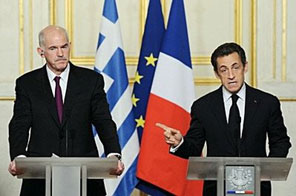Europe ready to help Greece 'if necessary': Sarkozy
PARIS: European governments are ready to help Greece pull itself out of its financial crisis "if necessary", French President Nicolas said Sunday following talks with the Greek prime minister.
"I want to be very clear. If necessary, eurozone governments will fulfil their commitments and there can be no doubt about that," Sarkozy told a joint news conference with George Papandreou.
"If Greece needs us, we will be there," he said.
The French president said governments of the 16-nation eurozone were working on a "certain number of specific measures" to address Greece's debt crisis but did not provide details.
Sarkozy noted however that "today, Greece is not in need of financing", suggesting that a bailout package was not on the cards.
"The Greek government has taken the measures that we expected. The eurozone governments must now be ready to take theirs," he added.
Following talks in Berlin, Papandreou was in Paris to seek French backing, just two days after Athens adopted new austerity measures to steer debt-crippled Greece away from financial ruin.
German Chancellor Angela Merkel and other EU leaders have so far refused to offer a bailout to Greece, which desperately needs to come up with 20 billion euros (27 billion dollars) by May to refinance debt.
Overall, Greece is looking at borrowing more than 50 billion euros this year.
Sarkozy is seen as less reluctant than Merkel to offer aid and had said ahead of the meeting that Greece's eurozone partners had no choice but to support Athens.
For his part, the Greek prime minister noted that "solutions exist to address problems if our country needs to borrow" and suggested these could include measures to combat speculation.
"We want to be able to borrow, like any other country of the eurozone, according to similar rates, perhaps not identical, but comparable," said Papandreou.
Greece wants to find a "European solution" to its debt crisis and has no immediate plans to ask the International Monetary Fund for help, he said.
Greece's suggestion that it would go the IMF had raised eyebrows in European capitals with some politicians warning that such a scenario would be a humiliating setback for Europe.
After Paris, Papandreou flies to Washington on Tuesday to seek backing from US President Barack Obama.
Papandreou's tour came after the Greek parliament on Friday approved a third round of austerity measures to rein in state spending, triggering violent protests and clashes with police in Athens.
Europe's biggest economy, Germany is widely seen as the most likely candidate to help prevent a Greek default, which would be disastrous for the eurozone.
After talks with the Greek prime minister on Friday, Merkel said that Greece does not need financial aid at present and that the stability of the eurozone was "assured".
Athens has promised the European Union that it will reduce its public deficit in 2010 by four percentage points from its current 12.7 percent of gross domestic product.
But two previous rounds of austerity measures failed to convince the financial markets that Greece would be pulling away from the abyss.
On the eve of the third series of spending cuts however, Athens successfully raised five billion euros in borrowings on the international bonds market, although these were offered at yields of more than six percent.






